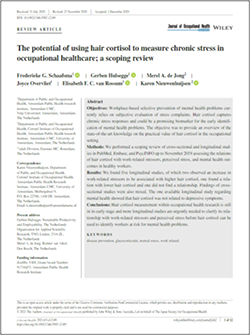#0108 The potential of using hair cortisol to measure chronic stress in occupational healthcare; a scoping review

The Relationship Between Hair Cortisol Levels and Work-Related Chronic Stress
Chronic stress has severe adverse effects on human health, and work responsibilities are often a major source of chronic stress. That said, public health professionals increasingly see workplaces not just as sources of stress but also as environments in which preventative programs can help to reduce stress levels and promote healthy long-term outcomes for workers.
However, a key challenge for workplace stress reduction programs is identifying those workers who are experiencing high chronic stress or are at high risk of experiencing it. Such programs currently rely on subjective data from self-report instruments; but such data cannot capture unconscious exposure to stressors or the myriad effects of mental stress on the body. There is, therefore, an urgent need for objective markers of chronic stress exposure.
One candidate marker that has received much attention from researchers is cortisol, a hormone that mobilizes the body’s energy reserves in response to mental or physical stressors. Levels of cortisol in the hair are easily measurable, so many studies on cortisol as a stress biomarker have focused on hair cortisol levels.
Given the attention surrounding cortisol, we decided to conduct a review of the existing scientific literature concerning the practical value of hair cortisol levels as markers of work-related chronic stress. We conducted our review by using academic search engines to find English or Dutch language articles published by November 2019. Our search yielded 17 cross-sectional studies, which analyzed data collected at a single timepoint, and five longitudinal studies, which analyzed data collected from participants at multiple timepoints.
Four longitudinal studies tested for associations between hair cortisol levels and workplace stress exposure, and two of them found an association between higher hair cortisol levels and greater exposure to work-related stressors. However, a third longitudinal study found the opposite relationship, and the fourth study found no relationship at all. The cross-sectional studies also reported mixed results. A longitudinal study that examined hair cortisol levels and depressive symptoms found no relationship between the two. A detailed description of our results appears in an article recently published in the Journal of Occupational Health.
Overall, the existing literature does not strongly support a relationship between hair cortisol levels and work-related chronic stress exposure. We recommend that further longitudinal studies be conducted.

Link to the original journal article:
https://onlinelibrary.wiley.com/doi/10.1002/1348-9585.12189
Title of the paper:
The potential of using hair cortisol to measure chronic stress in occupational healthcare; a scoping review
Authors:
Frederieke G. Schaafsma, Gerben Hulsegge, Merel A. de Jong, Joyce Overvliet, Elisabeth F.C. van Rossum, and Karen Nieuwenhuijsen




